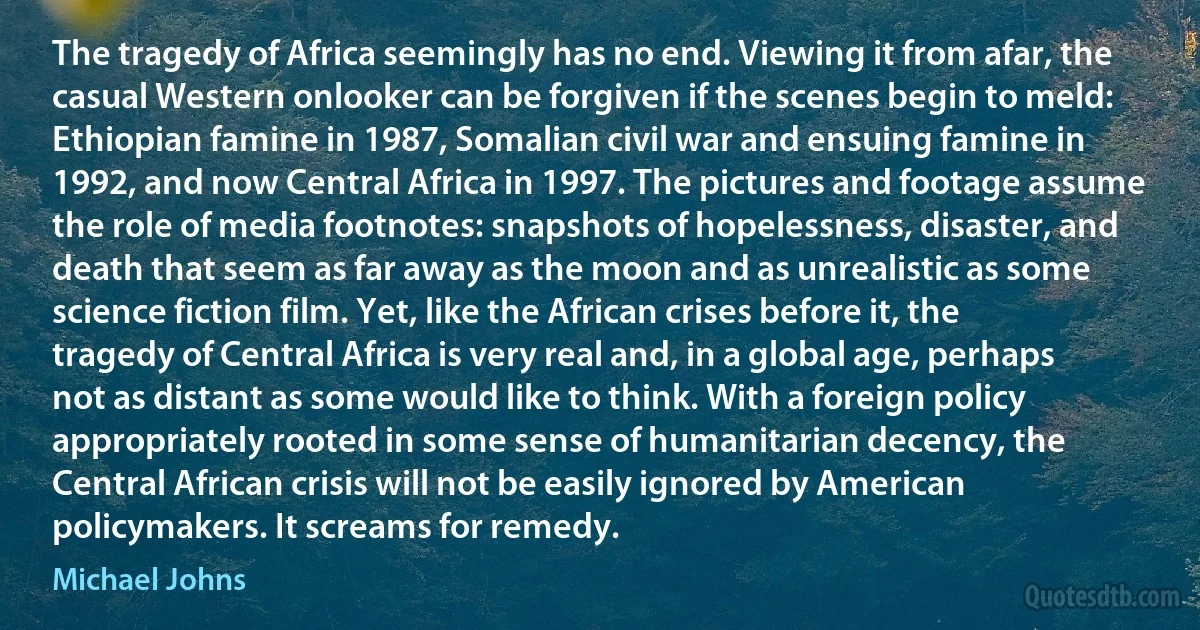
The tragedy of Africa seemingly has no end. Viewing it from afar, the casual Western onlooker can be forgiven if the scenes begin to meld: Ethiopian famine in 1987, Somalian civil war and ensuing famine in 1992, and now Central Africa in 1997. The pictures and footage assume the role of media footnotes: snapshots of hopelessness, disaster, and death that seem as far away as the moon and as unrealistic as some science fiction film. Yet, like the African crises before it, the tragedy of Central Africa is very real and, in a global age, perhaps not as distant as some would like to think. With a foreign policy appropriately rooted in some sense of humanitarian decency, the Central African crisis will not be easily ignored by American policymakers. It screams for remedy.
Michael JohnsRelated topics
afar african age begin casual central death end ethiopian famine far film foreign humanitarian media moon now perhaps real remedy science sense think viewing war western yet hopelessness meld global onlooker footageRelated quotes
Tragedy has been and will always be with us. Somewhere right now, evil people are planning evil things. All of us will do everything meaningful, everything we can do to prevent it, but each horrible act can't become an axe for opportunists to cleave the very Bill of Rights that binds us. America must stop this predictable pattern of reaction. When an isolated terrible event occurs, our phones ring demanding that the NRA explain the inexplicable. Why us? Because their story needs a villain. ... That is not our role in American society and we will not be forced to play it. ... Now, if you disagree that's your right, I respect that, but we will not relinquish it, or be silenced about it, or be told ‘do not come here, you are unwelcome in your own land.'

Charlton Heston
I read Stein's Three Lives, Crane's The Red Badge of Courage, and Dostoevski's The Possessed, all of which revealed new realms of feeling. But the most important discoveries came when I veered from fiction proper into the field of psychology and sociology. I ran through volumes that bore upon the causes of my conduct and the conduct of my family. I studied tables of figures relating population density to insanity, relating housing to disease, relating school and recreational opportunities to crime, relating various forms of neurotic behavior to environment, relating racial insecurities to the conflicts between whites and blacks... I still had no friends, casual or intimate, and felt the need for none. I had developed a self-sufficiency that kept me distant from others, emotionally and psychologically.

Richard Wright
Most of the writers I know come from a variety of backgrounds: history, journalism, engineering, physics. The common element here is not what you study, but the fact that you learn how to study, to do research, and to synthesize new ideas out of old. The soul of science fiction, and perhaps even all fiction, is to look at a situation and ask, "what would happen if....” Change some variables and see how that makes people react to the situation. So, getting yourself a good grounding in any field of study will supply you with a great background wealth of material to use to build your stories. Then you really just need to start writing and keep writing. Writing is a skills-based endeavor and there is no easy way to become successful at it. Writers write.

Michael A. Stackpole
Like any internationalist, I embrace Scotland's interdependence and the advantages that such interdependence confers. But in international relations - perhaps even more than the economic sphere - there are major advantages to pursuing an independent policy that promotes Scotland's global interests. Indeed it precisely because we live in an interdependent world - one where markets are integrating and information flow is unstoppable - a world where the reality of climate change acts as a daily reminder of our reliance on each other - that independence matters. Interdependence is a welcome fact of modern global politics. What matters in the Scottish national interest - above all else - are the terms on which Scotland engages. The equality of esteem, of authority between nations matters more now than it has ever done.

Alex Salmond
Three and a half million years separate the individual who left these footprints in the sands of Africa from the one who left them on the moon. A mere blink in the eye of evolution. Using his burgeoning intelligence, this most successful of all mammals has exploited the environment to produce food for an ever-increasing population. In spite of disasters when civilisations have over-reached themselves, that process has continued, indeed accelerated, even today. Now mankind is looking for food, not just on this planet but on others. Perhaps the time has now come to put that process into reverse. Instead of controlling the environment for the benefit of the population, perhaps it's time we control the population to allow the survival of the environment.

David Attenborough
